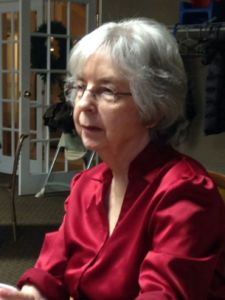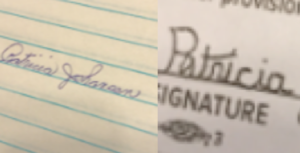MN Grandmother Takes on SEIU
 You could call it the story of Patricia and Goliath. The elderly rural Minnesota personal care assistant who stood up to the powerful public employee union–and won.
You could call it the story of Patricia and Goliath. The elderly rural Minnesota personal care assistant who stood up to the powerful public employee union–and won.
Johansen accused Service Employees International Union Healthcare Minnesota of deducting union dues without her permission from the small Medicaid payments she receives for caring for her granddaughter with special needs. The 75 year old grandmother insisted someone evidently forged her signature on a union card and demanded her money back.
I wrote about Patricia Johansen’s courage a year ago. Now Patricia’s story has gone national in a Wall Street Journal piece headlined “These Minnesota Workers Want Nothing to do with the SEIU.”
Patricia Johansen says the union first began badgering her—and frightening her—in 2014. Ms. Johansen is a personal-care assistant who spends her days tending to her disabled granddaughter. She lives in Minnesota, where a state-run program, called PCA Choice, pays qualified assistants a modest Medicaid subsidy to help ease the burden of caring for loved ones.
In 2013 Gov. Mark Dayton signed a law that declared personal-care assistants—some of whom, like Ms. Johansen, care for their own family members—to be public employees, but only for purposes of collective bargaining. For the Service Employees International Union this was an opportunity to expand its reach. Mr. Dayton essentially had given the SEIU a green light to unionize these assistants.
Then Ms. Johansen says the phone calls started, encouraging her to vote “yes” in a coming unionization election. Organizers also showed up at her door. She describes them as “pushy” people who tried to get into her home to “persuade” her. This scared Ms. Johansen, a senior citizen who lives alone with her granddaughter. She says she told the union many times that she had no interest in joining.
Johansen’s case has become a rallying point in what’s been described as the biggest union decertification campaign ever undertaken. A coalition of personal care assistants, MNPCA, has been collecting cards from disaffected PCAs like Patricia in hopes of forcing an election to dismantle SEIU’s bargaining unit. Center of the American Experiment’s Employee Freedom Project continues to actively support a campaign in which Patricia is far from alone.

Another personal-care assistant, who asked that her name be withheld for fear of retaliation, described similar union harassment around 2013 and 2014. The 29-year-old single mother characterized the frequent visits and phone calls as “stalking, absolutely.” Eventually, she told one of the union representatives that she would be voting no when her ballot came. It never did.
Is she certain there was no ballot? “Positive,” she tells me. “They scared me. I didn’t want them anywhere near my patient or my money. I looked for that ballot every day in the mail. It never came.”
Nevertheless, in August of 2015 she noticed that union dues were being taken out of her pay. Although she complained repeatedly to union leadership, for months the dues continued to be deducted. Like Ms. Johansen, she saved her pay stubs and correspondence and allowed me to review them. Unfortunately, she says she was told that a refund wasn’t possible.
The union “has denied any wrongdoing” but there may be another chapter or two in Patricia’s story. MNPCA attorneys say they will go to court to press their grievances if necessary.
This is a case that ought to interest Washington. The same tactic of unionizing home-health workers is playing out in at least nine other states. That’s something worthy of concern from the Trump administration—and Congress. A law to prevent Medicaid funds from being used as union dues would be a strong measure for assistants like Ms. Johansen, from a president who has promised to protect American workers.